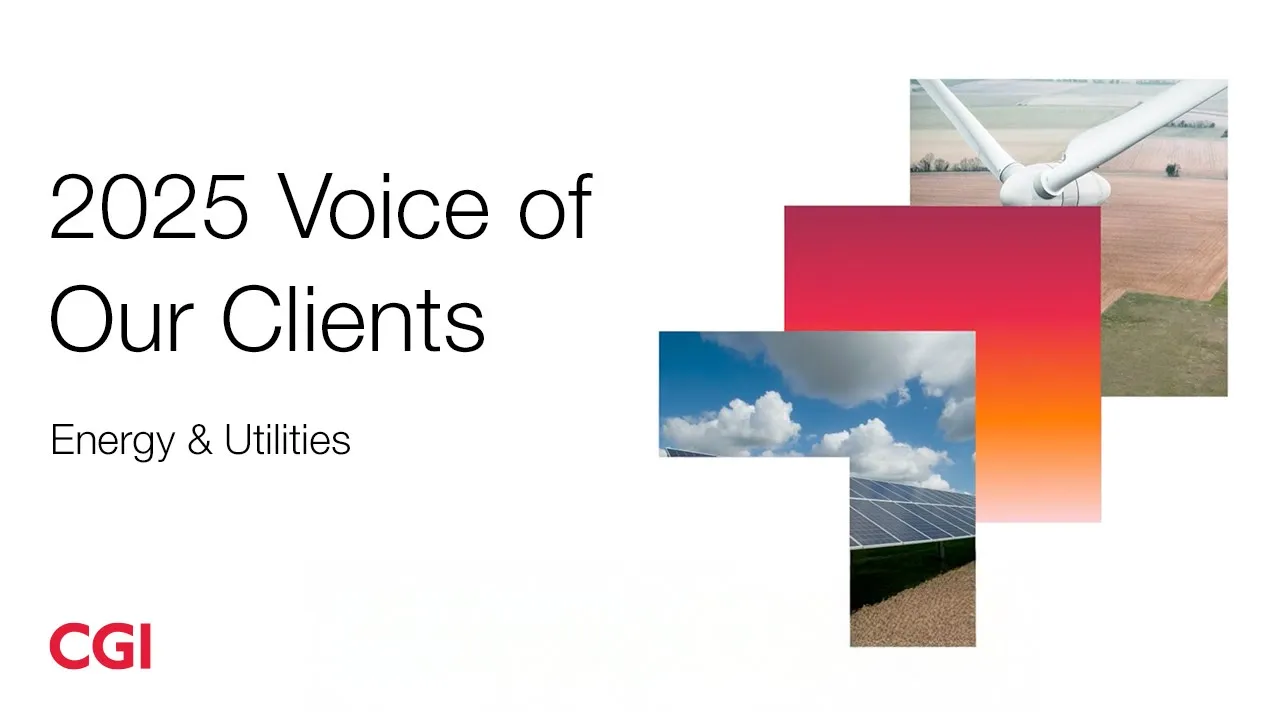How are Energy & utilities leaders using AI, data and digital strategies to navigate climate goals, workforce shortages and complex regulations? In this video, we explore insights from the 2025 CGI Voice of Our Clients research, based on in-depth interviews with more than 150 Energy & utilities executives on the priorities and challenges shaping transformation across the industry.
From GenAI pilots to predictive maintenance, discover how organizations are driving transformation through trusted data, agile operations and human-centric innovation.
Key trends covered in this video:
- Climate change and decarbonization strategy
- Digital acceleration and AI adoption
- Workforce transformation and upskilling
- Regulatory complexity and compliance tools
- Supply chain disruption and resilience
Learn from real-world examples that highlight how energy leaders are using AI to reduce emissions and improve operational decision-making.
At CGI, we help Energy & utilities organizations align digital investments with measurable business outcomes—accelerating decarbonization, improving resilience and enabling ethical AI adoption at scale.
Video transcript
- Adapting to disruption in Energy & utilities
-
Energy and utilities leaders are navigating rapid change from workforce shortages and decarbonization pressures to complex regulatory shifts.
Many are calling for more agile systems to adapt to evolving energy policies and trade fluctuations.
AI is changing how decisions are made on the ground, providing workers with focused content that allows them to do work faster, safer and make better decisions.
Take wind farms, for example.
AI operations can predict faults before they happen, automate and group service windows, and thus reduce overall downtime and improve operational KPIs.
- Insights from the CGI Voice of Our Clients research
-
In our Voice of Our Clients research, we interviewed 158 energy and utilities executives who are prioritizing targeted digital strategies, especially focused on AI implementation. While three quarters say digitization is reshaping their business models, over 30% are producing expected results from their strategy.
Most are exploring or piloting GenAI and a third are doing the same with advanced AI—signaling a clear shift toward intelligent, data-driven operations.
- Key industry trends driving sustainability, innovation and resilience
-
Our research identifies five key trends transforming the energy and utilities sector. Climate change remains a high-impact macro trend for almost 80% of executives.
The shift to renewables and carbon neutrality is shaping their priorities, with European executives citing it at 38 percentage points higher than North American.
Many now see sustainability as core to their strategy.
Driving adoption of AI-powered analytics to improve forecasting, optimize operations, and build resilience.
- Addressing workforce, economic and regulatory challenges with AI and modernization
-
Just over 60% report difficulty recruiting talent.
To address this, leaders are accelerating adoption of AI automation and digital tools that support early career professionals, enable cross-functional teams and retain company expertise.
Over 40% cite global economic shifts as a top concern, and many are responding by adopting reshoring strategies supported by AI-driven predictive management.
75% say digitization significantly impacts their business model. Though 38% face major challenges with their legacy systems. AI is also improving customer experience and boosting operational efficiency.
Nearly 80% of executives cite fast-evolving regulations as a top concern due to complex regulatory, fiscal, and political changes. This is driving demand for real-time AI-enabled compliance in agile decision-making.
- AI in workforce transformation: Improving productivity and safety
-
Nearly half of leaders say that business is highly impacted by what's going on in those social demographic changes that are moving forward, and that they're also having a talent shortage.
AI in the workforce is going to impact things basically in two key ways. First, it's helping automate routine tasks to free up employees to focus on much more high-value strategic work.
And more meaningful work. Secondly, it's going to expand what workers can do by placing all of the knowledge of the corporation into their hands.
We're scanning all of the data across the organization and putting the best practices in their hands so they can actually use this digital tool.
And this is something we see a great improvement on. Together these two shifts not only improve productivity, lower costs, but they also improve job safety as well as the overall wellbeing.
- Real-world use case: AI-powered records management
-
A leading oil and gas company partnered with us to improve records management, aiming to enhance information quality, streamline processes, and meet regulatory requirements.
As digital content grew, the clients saw an opportunity to modernize systems while supporting their teams and keeping operational continuity.
We introduced our CGI GovernWise360 solution powered by GenAI and predictive analytics.
Together with the client's engineering experts, we developed the intelligent records radar AI models, tailored for civil, electrical, and process engineering. This enabled fast, accurate identification and classifications of records—seamlessly integrated into existing workflows.
Tasks that once took months, now take minutes. Boosting speed, compliance, and productivity. The solution also supports a digital workforce—addressing skill shortages and equipping the next generation of workers with intelligent tools.
- From reactive to proactive AI in operations
-
This client example reflects broader industry trends where more than 50% of energy and utilities leaders now use GenAI to improve customer service.
We're seeing a shift from reactive to proactive maintenance. More than half of the leaders this year are using generative AI to improve the production in operations.
The benefit for organizations are fewer surprises, better use of resources, a workforce that is focused on higher KPIs and delivering tasks that are much higher value—producing a much better outcome across the board.
- Building responsible, scalable AI strategies
-
Successful organizations are adopting ethical and human-centric approach into their AI practices.
They are also being agile. They're having an agile approach across the organization for not only their organization itself, but the data that they need to free up within the organization at pace and scale.
My advice is to build upon a foundation of governance and trust.
Start small, with use cases that are business-focused and outcome-focused and involve your compliance people early and often.
Don't forget, it's about data, data, data. Strong data governance is key, not just within a department, but across the entire organization, if you're to get the benefits you want.
- Final takeaway: Aligning investments for impact
-
The message is clear. AI is no longer optional. It's a strategic imperative as leaders navigate decarbonization, workforce transformation, and regulatory change. Success depends on how they manage data, modernize systems and empower people.
The takeaway: focus where it matters most, align digital investments to business outcomes.
Embed AI with strong governance and trust and prioritize talent, agility and data readiness.
These insights from the Voice of Our Clients research offer a roadmap for leading with confidence in a smarter, more sustainable future.




